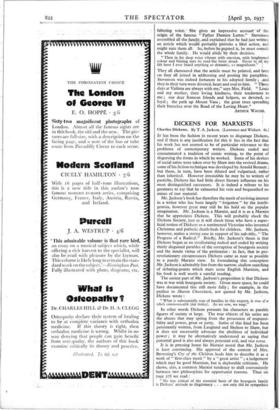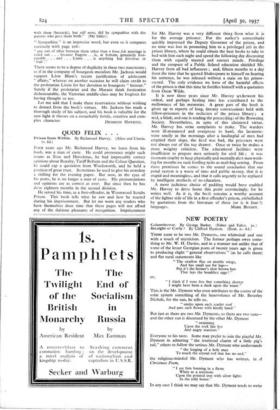DICKENS FOR MARXISTS
Charles Dickens. By T. A. Jackson. (Lawrence and Wishart. 6s.)
IT has been the fashion in recent years to disparage Dickens, and if there is any justification for this it lies in the fact that his work has not seemed to be of particular relevance to" the problems of contemporary writers. Dickens ended and consummated a tradition of comic writing, to the point of dispersing the forms in which he worked. Some of his devices of social satire were taken over by Shaw into the revived drama, some of his fiction-technique was developed by Arnold Bennett ; but these, in turn, have been diluted and vulgarised, rather than inherited. However irresistible he may be to writers of pastiche, Dickens has had little direct literary influence on his most distinguished. successors. It is indeed a tribute to his greatness to say that he exhausted his vein and bequeathed no mines of raw material.
Mr. Jackson's book has therefore the merit of reviving interest in a writer who has been largely " forgotten " by the intelli- gentsia, however great may still be his hold on the poPular imagination. . Mr. Jackson is a Marxist, and it is as a Marxist that he appreciates Dickens. This will probably shock the Dickens Society, just as it will shock Those who have a super- ficial notion of Dickens as a sentimental Victorian who invented Christmas and pathetic death-beds for children. Mr. Jackson, however, makes a strong case in support of his sub-title, " The Progress of a Radical." Briefly, Mr.. .Jackson's. thesis is that Dickens began as an ameliorating radical and ended by writing thinly disguised parables of the corruption of bourgeois society and the innate virtue of the proletariat : in fact, that in pre- revolutionary circumstances Dickens came as near as possible to a purely Marxist view. In formulating this conception Mr. Jackson is admirably free from the narrow, shallow snatching of debating-points which mars some English Marxists, and his book is well worth a careful reading.
The easiest part of Mr. Jackson's proposition is that Dickens was at war with bourgeois society. Given more space, he could have docUmented this still more fully ; for example, in the preface to Martin Chuzzlevvit, not quoted by Mr. Jackson, Dickens wrote :
" What is substantially true of families in this respect, is true of a whole commonwealth (my italics). As we sow, we reap."
In other words Dickens presents his characters as parable figures of society at large. The true objects of his satire' are the abuses that may spring from the possession of respqnsi- bility and power, great or petty. Satire of this kind has been persistently written, from Langland and Skelton to Shaw, but it does not necessarily advocate the abolition of individual power ; it may be alternatively understood as saying that potential good is also and always potential evil, and vice versa.
It is in pressing home his Marxist moral that Mr. Jackson is least convincing. His approval of the content of Mrs. Browning's Cry of the Children leads him to describe it as a work of " first-class merit " by a "great artist " ; a judgement which may be good Marxism, but is deplorable criticism. ' He shows, also, a common Marxist tendency to shift conveniently between two philosophies for opportunist reasons. Thui on page 278 we read :
" No less critical of the essential' basis of the bourgeois family is Dickens' attitude to illegitimacy -. . not only did he sympathise
with them (bastards), but still more, did he sympathise with the parents who gave them birth." (My italics).
" Sympathise " is an imprecise word, but even so it compares curiously with page 216: " any sort of affair between them other than a bona fide marriage is ruled out . . . because Eugene . is, at bottom, genuinely hon- ourable . . . and . . . Lizzie . . . is anything but frivolous or ' frail '."
There seems to be a degree of duplicity in these two statements; as if in the company of bourgeois moralists Mr. Jackson would support Leon Blum's recent justification of adolescent " affairs," whereas on another occasion he will claim credit to the proletarian Lizzie for her devotion to bourgeois " honour." Surely if the proletariat and the Marxist think fornication dishonourable, the Victorian middle-class may be forgiven for having thought so too.
Let me add that I make these reservations without wishing to detract from the book's virtues. Mr. Jackson has made a thorough study of his subject, and his book is valuable for the
new light it throws on a remarkably fertile, sensitive and com-



































































 Previous page
Previous page